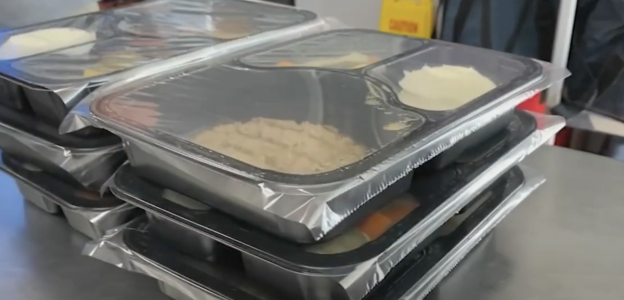Proposed budget changes could affect senior services—here’s what to know
By
Veronica E.
- Replies 0
Federal budget discussions for 2026 are underway, and community leaders are raising concerns about how possible changes might affect programs that many older Americans rely on each day.
These services—like affordable meal delivery, transportation support, and social engagement opportunities—are often funded through the Older Americans Act (OAA), a long-standing bipartisan initiative that’s helped support seniors for nearly 60 years.
These concerns come as local agencies report increasing demand for support, particularly in rural communities.
At The GrayVine, we know that budget conversations aren’t just about numbers—they’re about real people.
So we’re taking a closer look at what’s being discussed, how it might affect seniors, and what communities are doing in response.

The Older Americans Act helps fund programs like Meals on Wheels, low-cost rides to essential appointments, and health and wellness education.
At the North Big Horn Senior Citizens Center in Lovell, Wyoming, these services have become a lifeline for older adults across the region.
The center currently provides about 138 affordable meals a day, with meals served on-site and delivered to neighboring towns like Byron, Cowley, Deaver, and Frannie.
Director Kim Gifford said that if the budget is passed as currently proposed, the center could face a 12–15% cut in nutrition services, and up to 68% cuts in supportive services such as transportation, wellness programs, and community activities.
“We’re so rural, and we cover a wide area,” Gifford said.
“If we can’t provide these services people will be hurting.”
Transportation is another concern.
The center’s van program provides roughly 4,000 rides per year, helping seniors get to medical appointments, the grocery store, or even just to visit with friends.
These rides are especially critical for seniors who no longer drive and have no other options.
Like the meals program, transportation is partially supported by the OAA.
Without these services, Gifford said, more seniors may face isolation or go without basic needs.
The Older Americans Act, which was stalled in Congress last year, is now being addressed through the 2026 federal budget.
As part of the proposal, the department that traditionally oversaw the OAA would be dissolved, with its responsibilities split among three other agencies.
Aging advocacy groups have raised concerns that this could affect program continuity, though the details are still evolving.
Local leaders understand the need for careful budgeting, but they hope Congress will continue to prioritize funding that supports independence and dignity for older Americans.
The North Big Horn center is urging the public to call on lawmakers—including Wyoming’s congressional delegation—to preserve this funding.
“We just want people to be aware that this is happening,” Gifford said.
For many residents, the center’s services are more than just helpful—they’re essential.
Meals cost $10–$12 to prepare, but seniors pay just $4, thanks to federal subsidies.
Non-seniors pay $8.
Gifford noted that for some seniors, this is not only their only meal of the day, but also their only social contact.
Bookkeeper Melissa Cavender said the center is already operating on a tight budget and has been relying on leftover pandemic relief funds and local mill levy revenue to stay afloat.
But future cuts could mean raising prices or scaling back services.
“Every dollar we lose must be made up somewhere,” Cavender said.
“Raising prices is something we hesitate to do because quite a few people wouldn’t be able to afford it.”
“If the center starts using emergency funds just to get by,” she added, “the funds won’t last long.”
According to the National Council on Aging, more than 11,000 senior centers nationwide serve over a million older adults each day.
The Lovell center has served the community for over 50 years and continues to be a hub for nutrition, connection, and wellbeing.
If you’re concerned about the future of senior services in your area, here are some ways to help:
As budget decisions take shape, one thing is clear: for many seniors, these programs are more than just services—they’re a vital part of daily life.
Staying informed and speaking up can help ensure that support for older adults remains a priority.
Read next: Trump’s "MAHA food boxes" plan: What it could mean for seniors who rely on grocery aid

Do you or someone you love rely on senior center programs? What would it mean if those services were reduced or lost? Let us know in the comments—your story could help someone else feel seen, heard, and supported.
These services—like affordable meal delivery, transportation support, and social engagement opportunities—are often funded through the Older Americans Act (OAA), a long-standing bipartisan initiative that’s helped support seniors for nearly 60 years.
These concerns come as local agencies report increasing demand for support, particularly in rural communities.
At The GrayVine, we know that budget conversations aren’t just about numbers—they’re about real people.
So we’re taking a closer look at what’s being discussed, how it might affect seniors, and what communities are doing in response.

A warm, affordable meal like this is a daily lifeline for many seniors who rely on community centers for both nutrition and connection. Image Source: YouTube / ABC11.
What’s at stake
The Older Americans Act helps fund programs like Meals on Wheels, low-cost rides to essential appointments, and health and wellness education.
At the North Big Horn Senior Citizens Center in Lovell, Wyoming, these services have become a lifeline for older adults across the region.
The center currently provides about 138 affordable meals a day, with meals served on-site and delivered to neighboring towns like Byron, Cowley, Deaver, and Frannie.
Director Kim Gifford said that if the budget is passed as currently proposed, the center could face a 12–15% cut in nutrition services, and up to 68% cuts in supportive services such as transportation, wellness programs, and community activities.
“We’re so rural, and we cover a wide area,” Gifford said.
“If we can’t provide these services people will be hurting.”
Transportation is another concern.
The center’s van program provides roughly 4,000 rides per year, helping seniors get to medical appointments, the grocery store, or even just to visit with friends.
These rides are especially critical for seniors who no longer drive and have no other options.
Like the meals program, transportation is partially supported by the OAA.
Without these services, Gifford said, more seniors may face isolation or go without basic needs.
Also read: FBI report reveals seniors lost $4.8 billion to scams in 2024
What’s changing—and why
The Older Americans Act, which was stalled in Congress last year, is now being addressed through the 2026 federal budget.
As part of the proposal, the department that traditionally oversaw the OAA would be dissolved, with its responsibilities split among three other agencies.
Aging advocacy groups have raised concerns that this could affect program continuity, though the details are still evolving.
Local leaders understand the need for careful budgeting, but they hope Congress will continue to prioritize funding that supports independence and dignity for older Americans.
The North Big Horn center is urging the public to call on lawmakers—including Wyoming’s congressional delegation—to preserve this funding.
“We just want people to be aware that this is happening,” Gifford said.
Also read: Fresh food shouldn’t be a luxury: How one program is helping seniors eat healthier
Real-world impact
For many residents, the center’s services are more than just helpful—they’re essential.
Meals cost $10–$12 to prepare, but seniors pay just $4, thanks to federal subsidies.
Non-seniors pay $8.
Gifford noted that for some seniors, this is not only their only meal of the day, but also their only social contact.
Bookkeeper Melissa Cavender said the center is already operating on a tight budget and has been relying on leftover pandemic relief funds and local mill levy revenue to stay afloat.
But future cuts could mean raising prices or scaling back services.
“Every dollar we lose must be made up somewhere,” Cavender said.
“Raising prices is something we hesitate to do because quite a few people wouldn’t be able to afford it.”
“If the center starts using emergency funds just to get by,” she added, “the funds won’t last long.”
According to the National Council on Aging, more than 11,000 senior centers nationwide serve over a million older adults each day.
The Lovell center has served the community for over 50 years and continues to be a hub for nutrition, connection, and wellbeing.
Also read: Did you miss your high school prom? This event is giving seniors a second chance to dance
What you can do
If you’re concerned about the future of senior services in your area, here are some ways to help:
- Contact your representatives – Share your story and ask them to support continued funding for programs that serve older adults.
- Support your local senior center – Donations or volunteering can make a difference.
- Stay informed – Follow updates from organizations like AARP and the National Council on Aging.
- Share awareness – Sometimes the first step is simply letting others know what’s happening.
As budget decisions take shape, one thing is clear: for many seniors, these programs are more than just services—they’re a vital part of daily life.
Staying informed and speaking up can help ensure that support for older adults remains a priority.
Read next: Trump’s "MAHA food boxes" plan: What it could mean for seniors who rely on grocery aid
Key Takeaways
- The 2026 federal budget proposal includes changes to the Older Americans Act that could reduce or restructure senior service funding.
- At North Big Horn Senior Citizens Center in Wyoming, proposed cuts could reduce nutrition funding by 12–15% and other program funding by up to 68%.
- The center currently serves 138 meals a day and provides about 4,000 rides annually—many to seniors who lack transportation.
- Local leaders are asking the public to contact lawmakers and help preserve these critical supports.
Do you or someone you love rely on senior center programs? What would it mean if those services were reduced or lost? Let us know in the comments—your story could help someone else feel seen, heard, and supported.






